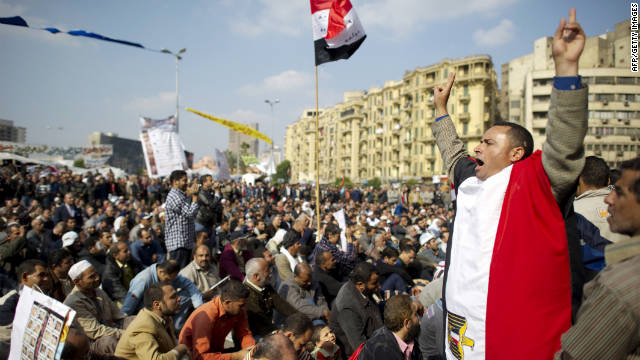December 3, 2011 -- Updated 1355 GMT (2155 HKT)

An anti-military rule protester shouts slogans in Tahrir Square on Friday.
STORY HIGHLIGHTS
- The Muslim Brotherhood's political wing gets the highest percentage
- The more hard-line Al Noor Salafi Movement also had a strong showing
- A liberal bloc was third in the voting
- The vote was the first round in a complex process
The Freedom and Justice Party, the political wing of the Muslim Brotherhood, received 40% and Al Noor Salafi Movement won 20% of the said Yousri Abdel Kareem, head of the executive office of the Higher Judicial Election council.
Al Noor Salafi, a hardline group, and the Muslim Brotherhood, a more moderate movement, each claimed a lead after votes were cast on Monday and Tuesday.
The Egyptian Bloc-Liberals won 15% and the Al Wasat, a moderate Islamist party, won 6%. The Al Wafd Party won 5% and the Justice Party, 1%.

Most Egyptians voted this week
This week's voting in Egypt marked the first round in a complex,
multi-step process that will first pick members of the lower house of
parliament.The elections for the lower house are scheduled to take place in three stages, based on geography. The last of the three stages is set to take place in January 11. Upper-house elections will run between January and March.
Presidential elections will be held by June, according to the military.
Voter turnout was initially reported by the country's election board at 62%, but the board said it would recalculate the figure after reporters raised questions about the number of registered voters used in the calculation, suggesting the true figure was lower.
Abdel Moez Ibrahim, head of the judicial election committee said problems arose during the polling that will be addressed in the next round of voting. They include campaigning on the days of the elections, long lines and the late arrival of a limited number of ballots.
The Islamist movements made their strong showing after similar parties recently won elections in Morocco and Tunisia. Turkey's Justice and Development Party, a movement with Islamist roots, easily retained power in elections there last spring. The secular government in predominantly Muslim Turkey is seen as a modern model for democracy in the region.
The Muslim Brotherhood was founded in 1928 and has been building a base of support even during the era of President Hosni Mubarak, when it was officially banned but tolerated. Some observers think the Brotherhood harbors an anti-Western and totalitarian agenda, even though it embraces moderation and democracy in public.
But the movement is entrenched in mainstream Egyptian politics, and its leaders do not appear to be wild-eyed fanatics. Most are highly educated -- doctors, lawyers, engineers, professors and businessmen -- and come from solidly middle-class backgrounds.
Al Noor Salafi is the first Salafist group to register as a political party in Egypt. Salafis are conservative, religious purists and have been accused of stoking sectarian strife against Egypt's Christian minority and of plotting to undermine the country's fledgling democracy.

No comments:
Post a Comment